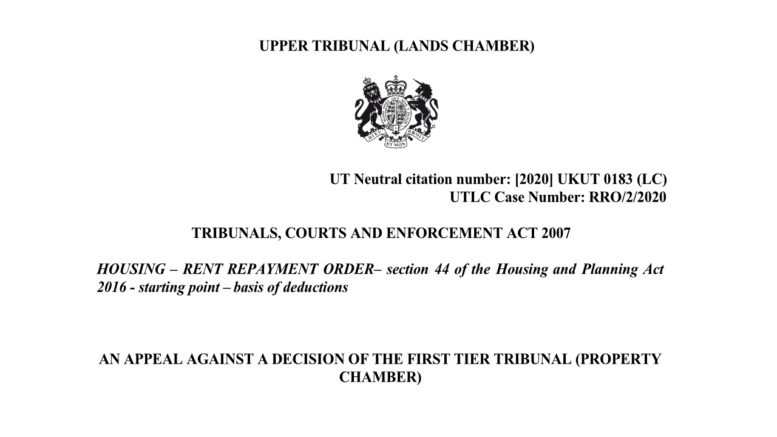A rod used to beat the back of wayward landlords has been made much thicker and longer as the result of a recent Lands Tribunal decision.
The rod in question is the ability of tenants, and in some cases local authorities, to make rent repayment claims, which can be awarded on top of other fines and penalties. Some local authorities are openly encouraging tenants to make use of this right.
Rent Repayment Orders were first introduced in 2004 in conjunction with licensing for houses in multiple occupation, and were intended as reinforcement of the HMO licensing requirement.
But as time has gone on, the list of transgressions for which RROs can be made, and the potential size of those awards, has continued to grow.
A significant change came with the 2016 Housing and Planning Act which both changed the basis on which repayment orders could be calculated and also increased the list of ‘offences’ covered.
Rent repayment of up to 12 months’ rent can now be claimed if a landlord has:
- illegally evicted or harassed tenants to make them leave their rented properties;
- used or threatening violence to enter a rented property;
- not complied with a local authority improvement notice;
- let or managed a rented property after receiving a banning or prohibition order;
- let or managed a property in an area where a license is required, without having such a licence;
- let or managed an HMO without an HMO licence.
It is not necessary for the landlord to have been convicted of one of these offences for an RRO to be made. The tenant, or other claimant, has only to convince an Upper Tier Tribunal, beyond reasonable doubt, that the landlord has committed one or more of these offences.
A 2020 Upper Tier Tribunal appeal confirmed that this requirement did not mean there must be no doubt whatsoever that the landlord had breached the rules, only that there must be no ‘reasonable’ doubt about this. Another confirmed that a claim of being unaware of the rules was not an acceptable defence.
But the appeal in the case of Vadamalayan v Stewart and others, published in June this year, is expected to have greater impact than both these decisions. This is because it increases considerably the potential size of future rent repayment awards.
Babu Rathinapandi Vadamalayan took his case to the Upper Tribunal Lands Chamber when he believed the £17,420 awarded against him by a First Tier Tribunal had been excessive. It took no account, he said, of the amount he had spent on his Finchley Road, London NW3 property. This had included damp proofing, tiling, a new boiler, insurance, estate agents’ fees and management costs. Nor did it allow for the £8,000 he had already paid as a penalty for breaching licensing requirements.
Judge Elizabeth Cooke said it had been the practice of First Tier Tribunals to allow deductions from rent – which amounted to £28,600 per annum in this case – but that that had been a mistake.
While the original 2004 legislation required tribunals to act ‘reasonably’ in calculating awards, that was no longer the case. Since 2016 the requirement was to base awards on gross rents and not upon letting ‘profits’.
So while the tribunal is required to consider whether any doubt about a landlord’s behaviour is beyond ‘reasonable’ reservations, calculation of the rent repayment order is no longer tempered by a requirement of reasonableness. ‘It is not possible to find in the current statute any support for limiting of the rent repayment order to landlord’s profits’, said the Judge. ‘The principle should no longer be applied’.
The deductions that Mr Vadamalayan had asked for, either enhanced his own property or had been made to meet landlord obligations. ‘There is no reason why a landlord’s costs in meeting his obligations under the lease should be set off against the cost of meeting his obligation to comply with a rent repayment order’, said Judge Elizabeth Cooke.
Neither did she agree that the £8,000 fine paid by the landlord should be allowed as a deduction from a RRO.
The approach of deducting expenses so as to arrive at a figure for profits is no longer appropriate and not in accordance with the law, she held. She did concede that ‘there will certainly be cases where the landlord’s good conduct, or financial hardship, will justify an order less that the maximum’.
The Judge acknowledged that her ruling would be seen by landlords as harsh, but said her understanding was that ‘Parliament intended a harsh and fiercely deterrent regime of penalties for the HMO licensing offence’.
The order requiring Mr Vadamalayan to repay his tenants £17,420 was confirmed.
The case means the starting point for rent repayment awards will now be the full rent, said Robin Stewart who specialises in this area of law at Anthony Gold solicitors
‘However, that does not necessarily mean that the full rent will be the usual (or a common) result. The Tribunal will have to consider whether RROs for the full rent should become the norm, or whether this is a punishment reserved for the worst offenders;, he said.
‘The court will still have a discretion on the amount it awards (in most cases) but that will be based on a higher figure’.
The worry is that landlords might inadvertently fall foul of requirements and so open themselves to possible repayment claims. Buying properties with guaranteed rental income could be a particular area of concerns.
Stewart suggests landlords protect themselves from rent repayment orders by:
- keeping up to date with HMO and also additional and selective licensing rules in force in the areas where their rental properties are to be found;
- being wary of ‘rent to rent’ or ‘guaranteed rent’ arrangements since such schemes can often be associated with unlicensed HMOs;
- Fixing any licensing problems quickly, since the longer they are left, the larger any rent repayment order is likely to be.
Landlords will do well to head the advice since local authorities are latching onto the enforcement and deterrent possibilities afforded by rent repayment orders.
In Coventry a landlord was recently ordered to pay back just under £11,000 in rent that she received while letting an HMO without a licence.
‘We are working with landlords to raise property standards’, said Councillor Tariq Khan, cabinet member for housing and communities at Coventry City Council.
‘It is not fair for landlords to evade compliance and benefit financially from operating illegally, while the vast majority of landlords are complying.
‘This first rent repayment order should serve as a stark warning to the minority of landlords who continue to be unlicensed.
‘The legislation gives tenants a right to reclaim rent where landlords have significantly failed to comply with housing law and the Council will support them to do this.
‘Landlords face not only prosecution for non-compliance, which if successful will result in a fine and a criminal record, but if convicted, they could also be handed a rent repayment order.
Coventry’s HMO licensing regulations were changed in October 2018 when mandatory licensing was extended to cover properties two storey as well as three storey properties. At the time the council estimated that an additional 1,200 HMO’s would require licences, bringing the total in the city to 2,400.
When two Bristol landlords were recently ordered to repay nearly £5,000 in rent, one having been found to have harassed her tenants to leave, and the other having failed to comply with an Improvement Notice, the Council was quick to laud the importance of RROs.
‘This repayment order shows how important it is for tenants to come forward and assert their rights. The council is dedicated to assisting tenants where help is needed’, said Bristol City Councillor Paul Smith, the cabinet member for housing.
‘If you are a private tenant being harassed in your home or if you have been illegally evicted, then you may be able to claim your rent back and we urge more tenants to come forward’.
Bristol has information for tenants about Rent Repayment Orders on its website. The homeless charity Shelter has also published information for tenants.
Rent repayment orders under the Housing and Planning Act 2016, Guidance for Local Housing Authorities is available on the Government’s website.







